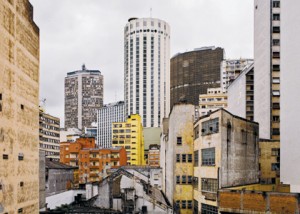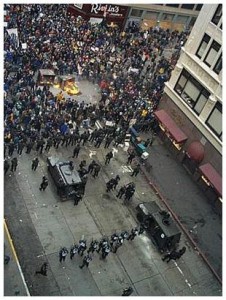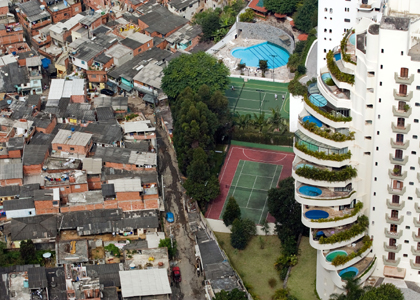“It is foolish to deny the role and power of objectifications, the capacity of things we create to return to us as so many forms of domination” (David Harvey, 7)
We are at the head of a long battle to place the ideals of human rights center-stage. The power of the state has been rescaled with the simultaneous rise of multi-lateral and transnational institutions (UN, EU, ect.) and decentralization of responsibility to the local level. In the wake of this rescaling, new political spaces have emerged. Appropriate to our contemporary urban age, the “right to the city” will be a defining force in future urban life: “the right to participate in the city as an ongoing work of creation, production, and negotiation” (Burke). – The city is the most expressive manifestation of the ever-present tendency to remake the world around us. In the words of Robert Park, “If the city is the world which man created, it is also the world in which he is henceforth condemned to live. Thus, indirectly, and without any clear sense of the nature of his task, in making the city man has remade himself” (23).
The city is the most expressive manifestation of the ever-present tendency to remake the world around us. In the words of Robert Park, “If the city is the world which man created, it is also the world in which he is henceforth condemned to live. Thus, indirectly, and without any clear sense of the nature of his task, in making the city man has remade himself” (23).
For David Harvey, the right to the city is therefore “far more than the individual liberty to access urban resources: it is a right to change ourselves by changing the city” (23). Our human experience is governed by a feedback loop between our activity and our material surroundings. The spaces we produce set powerful constraints upon future activity.
“Politics does not merely use the organization of space to its own ends. Politics is the organization of space” (Bertsch and Sterne). – The process of urbanization has been dictated primarily by the imperatives of growth, where city governments act as agents on behalf of capital. Characterized by a deal-making ethos, their actions appropriate and manipulate ideas regarding the definition of the public good and the objectives of the future city. The “right to the city” seeks to revise the city as not merely a site for the absorption of surplus capital, but as a space of humane cooperation, creativity, interaction, and affect. In its most basic definition, the right to the city is the right to urban livelihood with dignified and fair access to shelter, shared services, employment, and food security. Reclaiming urban spaces is an attempt to assert this right. We saw it as protesters marched in the “no-protest zones” in Seattle of 1999, and we see it everyday when the homeless reclaim public spaces as police try to push them along (Vancouver’s Downtown Ambassadors now do this micro-policing on behalf of the private sector).
Reclaiming urban spaces is an attempt to assert this right. We saw it as protesters marched in the “no-protest zones” in Seattle of 1999, and we see it everyday when the homeless reclaim public spaces as police try to push them along (Vancouver’s Downtown Ambassadors now do this micro-policing on behalf of the private sector).
The city is a terrain of political struggle, as well as a site of possibility. The future cities we have examined all fracture across the possible outcomes of a struggle for the right to the city. How democratic is the utilization of the surplus created by the aspirations, ideologies, and labor of the collective? The picture is crystal clear in Metropolis as the bourgeoisie overlook the toil of the working class in the depths of the machine-city.
The situation in Bladerunner is less clear as the exodus of the city to space has left those behind in a eternal present of deterioration. The inhabitants of LA 2019 live in a hyper-commodified culture devoid of nature. It is unclear as to what are the major forces in the organization of urban life, which is perhaps what, in part, makes this dystopic portrayal so unsettling. The roots of this capitalist hell seem to lie in the voluntary reproduction of current trends (inaction-a failure to assert our right to the city).
The “right to the city” may be an overburdened concept, but it is an inherently utopic vision creating a space of potential.
Harvey D (2008) Right to the city. New Left Review 53: 23-40
Burke A (2005) Review of The Right to The City: Social Justic and the Fight for Public Space by Don Mitchell. http://www.h-net.org/reviews/showrev.php?id=10293

ha, this essay was really good. i liked how you referenced Downtown Ambassadors too, because its funny how public perception paints them as ‘friends of the homeless and disadvantaged..’ how wrong that is!!!